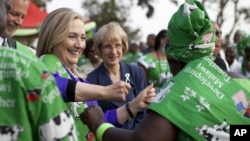JOHANNESBURG — U.S. Secretary of State Hillary Clinton is in South Africa as part of her tour of the continent. She met with former president Nelson Mandela at his home Monday before taking part in a high-level summit aimed at promoting U.S. investment and trade -- which has been a key focus of the secretary's trip. On Tuesday, she travels to the capital, Pretoria, to participate in the third annual U.S.-South Africa Strategic Dialogue.
Clinton spoke at the U.S.- South Africa Business Summit Monday in Johannesburg. The event brought together 200 top business executives and government officials from both countries.
Clinton spoke at the U.S.- South Africa Business Summit Monday in Johannesburg. The event brought together 200 top business executives and government officials from both countries.
"What I think we have to look to is not only helping our own businesses and yours be more competitive, grow, create jobs, but then how we translate economic growth into opportunities for people, particularly those who still need to be given a chance to work themselves and their families out of poverty," Clinton said.
In South Africa, Clinton has been joined by a delegation of 10 senior U.S. business executives representing a wide range of sectors including aviation, energy and shipping.
South Africa, Clinton said, plans to make "big investments" in infrastructure over the next 20 years that could create "massive new opportunities" for American businesses and jobs in both countries.
Trade between the countries already totals $22 billion annually. South Africa is the leading market on the continent for American goods, while the United States is both an important export market and a source of foreign direct investment for South Africa.
Razia Khan, the head of Africa research at London-based Standard Chartered Bank, says Clinton needs to cement those business ties.
"It's about being able to secure the relationship, ensuring that their interests are aligned, and that there is a framework for working through disagreements. Both South Africa and the U.S. have almost been sidelined by the importance of China, the speed with which we've seen China-Africa trade increasing," Khan said.
Africa is home to some of the world's fastest growing economies and populations. Analysts say the continent is increasingly a land of investment opportunity, not risk.
South Africa holds the rotating African Union leadership, which Khan says makes the country influential in molding foreign trade relations on the continent.
Sub-Saharan Africa
Boosting U.S. trade and investment in sub-Saharan Africa is one of the cornerstones of the Obama administration's Africa foreign policy.
"Africa is more than a billion people now, more than two billion by the half century mark. [That] represents a vast untapped market for U.S. trade and investment," said J. Peter Pham, Director of the Washington-based Michael S. Ansari Africa Center.
The United States is Africa's second largest trade partner after China, which is known to leverage infrastructure projects for access to Africa's consumers and its natural resources.
Clinton kicked off her trip with a speech in Dakar by saying the U.S. will seek out business opportunities but not at the expense of democracy and human rights.
"The United States will stand up for democracy and universal human rights even when it might be easier or more profitable to look the other way, to keep the resources flowing. Not every partner makes that choice, but we do and we will," she said.
China in Africa
China criticized Clinton's remarks as "cheap shots," aimed at "discrediting China's engagement with the continent."
Razia Khan of Standard Chartered says Africa's future prosperity depends on more than increased trade, be it with China, the U.S. or other countries. Africa, she says, needs to diversify its exports.
"It (Africa) has primarily been seen as a producer of raw materials, (it) may not have the infrastructure, (it) may not have the scale economies in place in individual countries to really be able to do much in the way of value addition to boost its own manufacturing sector," Khan said.
While in South Africa, Clinton will continue her push for American companies to invest in Africa. She will also highlight U.S. efforts to facilitate the import of African goods through measures like the African Growth and Opportunities Act, which allows African countries to sell certain manufactured items into the U.S. quota-free and duty-free.
However, Khan said those efforts, while positive, have not yet had a "major influence."
"Much more emphasis is needed in this area because unless Africa can diversify its export base, unless we do see greater value additions, most African economies are simply not going to be able to produce the formal sector jobs that their demographics imply they absolutely have to be creating," Khan said.
Population Boom
The African Development Bank and the United Nations have released joint reports this year on concerns that Africa's population boom coupled with its current trend of "jobless," commodities-based growth poses a serious risk to future security and stability.
Africa's youth population will not only double by 2045, the studies say, but it will also be better educated, yet less able to find work, if current trends continue.
Khan says increased trade will help Africans reap the benefits of their growing economies.
"There is no question about it, that one way to lift a greater number of people out of poverty is to have more economic activity and that is made easier through increased trade. It really doesn't matter whether that trade is with the East or with the West," Khan said.
Earlier Monday, Clinton met privately with former South African president Nelson Mandela at his home in the city of Qunu. The former president recently turned 94 and rarely makes public appearances.
Map of Hillary Clinton's Stops in Africa
View Clinton's Africa trip in a larger map




